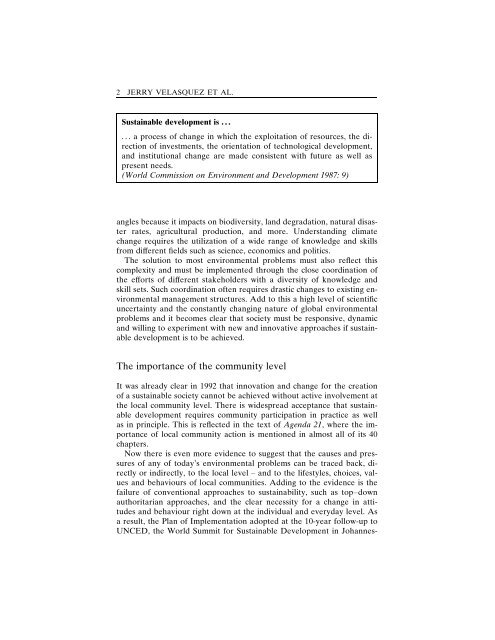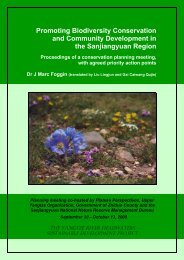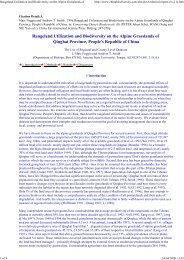Book summary - Marc Foggin Photography
Book summary - Marc Foggin Photography
Book summary - Marc Foggin Photography
Create successful ePaper yourself
Turn your PDF publications into a flip-book with our unique Google optimized e-Paper software.
2 JERRY VELASQUEZ ET AL.<br />
Sustainable development is . . .<br />
. . . a process of change in which the exploitation of resources, the direction<br />
of investments, the orientation of technological development,<br />
and institutional change are made consistent with future as well as<br />
present needs.<br />
(World Commission on Environment and Development 1987: 9)<br />
angles because it impacts on biodiversity, land degradation, natural disaster<br />
rates, agricultural production, and more. Understanding climate<br />
change requires the utilization of a wide range of knowledge and skills<br />
from different fields such as science, economics and politics.<br />
The solution to most environmental problems must also reflect this<br />
complexity and must be implemented through the close coordination of<br />
the efforts of different stakeholders with a diversity of knowledge and<br />
skill sets. Such coordination often requires drastic changes to existing environmental<br />
management structures. Add to this a high level of scientific<br />
uncertainty and the constantly changing nature of global environmental<br />
problems and it becomes clear that society must be responsive, dynamic<br />
and willing to experiment with new and innovative approaches if sustainable<br />
development is to be achieved.<br />
The importance of the community level<br />
It was already clear in 1992 that innovation and change for the creation<br />
of a sustainable society cannot be achieved without active involvement at<br />
the local community level. There is widespread acceptance that sustainable<br />
development requires community participation in practice as well<br />
as in principle. This is reflected in the text of Agenda 21, wheretheimportance<br />
of local community action is mentioned in almost all of its 40<br />
chapters.<br />
Now there is even more evidence to suggest that the causes and pressures<br />
of any of today’s environmental problems can be traced back, directly<br />
or indirectly, to the local level – and to the lifestyles, choices, values<br />
and behaviours of local communities. Adding to the evidence is the<br />
failure of conventional approaches to sustainability, such as top–down<br />
authoritarian approaches, and the clear necessity for a change in attitudes<br />
and behaviour right down at the individual and everyday level. As<br />
a result, the Plan of Implementation adopted at the 10-year follow-up to<br />
UNCED, the World Summit for Sustainable Development in Johannes-





